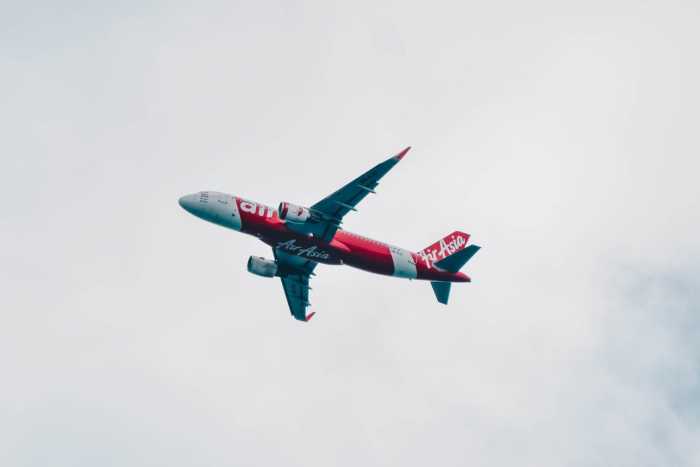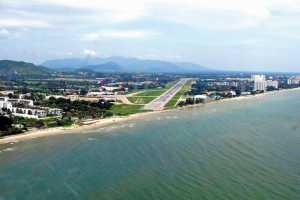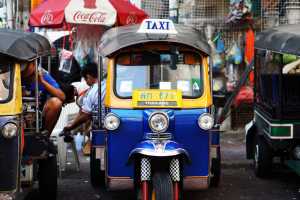
Phuket Cannot Escape Impact Of World Aviation Turmoil.
9th Aug 2010

The airline industry is in one of the worst tailspins it has experienced since the September 11, 2001 attacks and Phuket will not escape the fallout.
This doomsday scenario is shared by many in the industry because of the ongoing spiraling impact of rocketing oil prices. Remember airlines pay a lot more for refined jet fuel than the standard so much per barrel quoted in the media.
The International Air Transport Association, which represents around 290 airlines, is said in Asia Pacific international passenger traffic growth fell to 3.2 percent from 4.5 percent in June. In cargo the situation was worse: Asia Pacific led the world with a -4.8 percent contraction year on year.
Commented Giovanni Bisignani, IATA's Director General and CEO: 'The airline sector is in trouble. Losses this year could reach US6.1 billion, more than wiping out the USD5.6 billion airlines made in 2007. Falling demand and rising costs are shaping the industry.' Airlines like British Airways and American are talking merger to ensure long term survival and there have been a string of loss announcements, especially by US carriers.
To give you an idea of how much fuel has risen since 2003, here are some statistics.
In 2003 fuel was 14 percent of an airline's operating costs, the average price per barrel of crude oil was USD28.8 and the total fuel cost for the airline industry was USD44 billion. Fast forward to 2008 [ based on June figures ] fuel is 36 percent of operating costs; the average price of a barrel of crude oil is USD122 [ since reduced ] and the total fuel bill is USD189 billion.
The good news for Phuket could be that demand in the Middle East-Asia market remains strong compared to the rest of the world. Global economy travel continues to grow at 3.4 percent in June compared with the previous year but IATA said demands appears to be slowing.
From a Phuket perspective while the overall global situation is depressing, with Phuket developers and hoteliers targeting the Middle East and lucrative Asian markets like Hong Kong, Japan and Singapore and, to a lesser degree, China, the trends within Middle East-Asia are more encouraging.
So how is this impacting on Phuket? The Nok Air grounding of six aircraft because of rising fuel costs was a typical example of what is happening world wide. It had an immediate effect on passengers transiting through Suvarnabhumi Airport to Phuket, with many simply not being able to obtain flights for days, thus ruining their holidays. Nok Air's subsequent decision to fly on weekends helps a bit, but it is only sticking plaster.
And Nok Air's dilemma underscores a deeper problem with the Thailand aviation environment. The airline opted, indeed pushed, to fly out of the old Don Meaung airport to keep landing fees and other costs down as Suvarnabhumi was too expensive for its form of low cost model. But, as a result, Nok Air was not picking up very many of the hundreds of thousands of transit passengers coming through Suvarnabhumi and on to destinations like Phuket. There is now consideration for it going back to Suvarnabhumi so it can pick up this traffic in co operation with its nominal 'parent' Thai Airways.
Even better than transit passengers through Bangkok would be more direct flights to Phuket. With direct flights from Japan, Singapore, China, Hong Kong and Australia and more than a dozen charter flights out of the far northern hemisphere, such as Russia, Finland and Scandinavia, Phuket is well served but if the continued growth in hotel rooms is to be profitably served we need more. THAI has resumed Narita, Japan to Phuket flights, which is encouraging, but with its current financial difficulties THAI's options to expand its operations are limited in the short term.
Michael Ayling, Managing Director of Laguna Phuket Resorts and Hotels, the island's biggest hotel group, made the pertinent comment in a recent Phuket Gazette 'First Person' column that Phuket must not allow itself to be lured into a false sense of security as a destination. Continued enhancement of Phuket's brand awareness is required if the island is to maintain its leadership role.
Mr Ayling wants to see more attractions built, such as theme parts and water parts to lure visitors. These and other destination marketing ideas are very good---but they will mean very little if air services to Phuket are reduced or seriously disrupted by the current aviation global crisis.
At this stage the most optimistic scenario for Phuket would be:
' One Two Go, which was grounded by the Department Of Civil Aviation for safety and legal reasons, meets all requirements and received its operating certificate back on 21 August, when the initial 30 day ban expires. One Two Go and Nok Air's groundings have put unprecedented [ but profitable, one assumes ] pressure on Thai Air Asia and Thai Airways to meet demand with existing capacity'in other words not putting on extra flights but filling up existing flights to full passenger loads.
' One Two Go re-emerges as a ' unique' budget carrier with more full service benefits. This is something the company is said to be working on.
' Nok Air continues its weekend flights and, in the meantime, undergoes a substantial restructuring of the business by moving to Suvarnabhumi and adjusting their schedule and route network to better co ordinate with Thai Airways and to pick up more international transit passengers.
' Thai Airways increases capacity to cover the Nok Air shortfall, assuming One Two Go resumes flights. If they do not THAI would have to look at increasing capacity through more flights or larger aircraft on some flights to cover the shortfall.
' Thai Air Asia is in a similar position to THAI. It would need to look at increasing capacity to get its share of a larger market created by the absence, or reduced services, of the other airlines. However, as a low cost carrier it has more constraints on it to increase capacity quickly on such a short haul route.
' The charter businesses in places like Scandinavia and around Asia continue to come to Phuket despite the oil prices. Many hotels and short stay condominium complexes are geared to this market, mainly from Russia and Scandinavia.
These scenarios, apart from the last one, are very much contingent on whether One Two Go gets air born again. Despite the fallout from the 2007 crash and subsequent publicity, One Two Go was still meeting a need on the Bangkok-Phuket route. It is a 50-50 bet if One Two Go resumes services. The results of the investigation into the crash are expected to be delivered to a high powered committee in Thailand at the end of September.
So far the Thai based airlines have resisted taking the drastic action some US airlines have taken, or are considering, such as removing in flight entertainment, paying for IFE headphones, virtually eliminating food on domestic flights and applying extra charges for the number of, and overweight, baggage. But even these US airlines cannot escape the safety issue. Two of the biggest, Southwest Airlines and United Airlines both face stiff fines for allegedly breaching safety regulations.
Phuket will always enjoy a high position as a popular destination despite global turmoil and other negative impacts such as SARs, bird flu, September 11 and the tsunami and each time it has emerged stronger than before.
There are strong arguments for the hospitality/tourism industry to promote the island as an all year round destination, rather than being too focused on the 'wet' and 'dry' season scenarios.
It would be fair to say that this current fuel crisis and its impact on the aviation industry, including here in Thailand, has been much more severe and long lasting than many other crises. Coupled with a slowdown in world demand we can only hope that the forces causing the oil crisis pull back and we can get on with building Phuket, through aviation, as the world's premier tourist destination.









